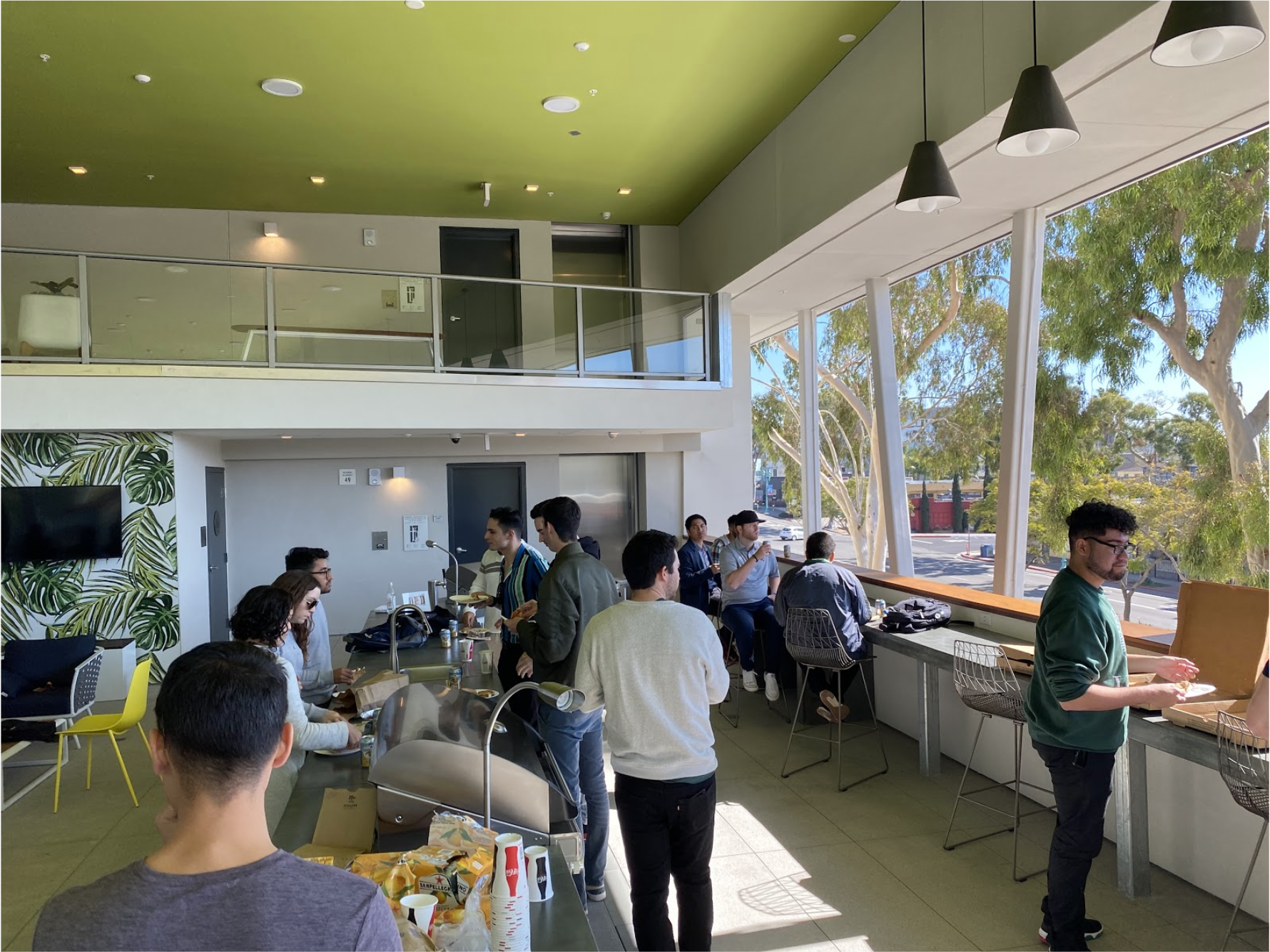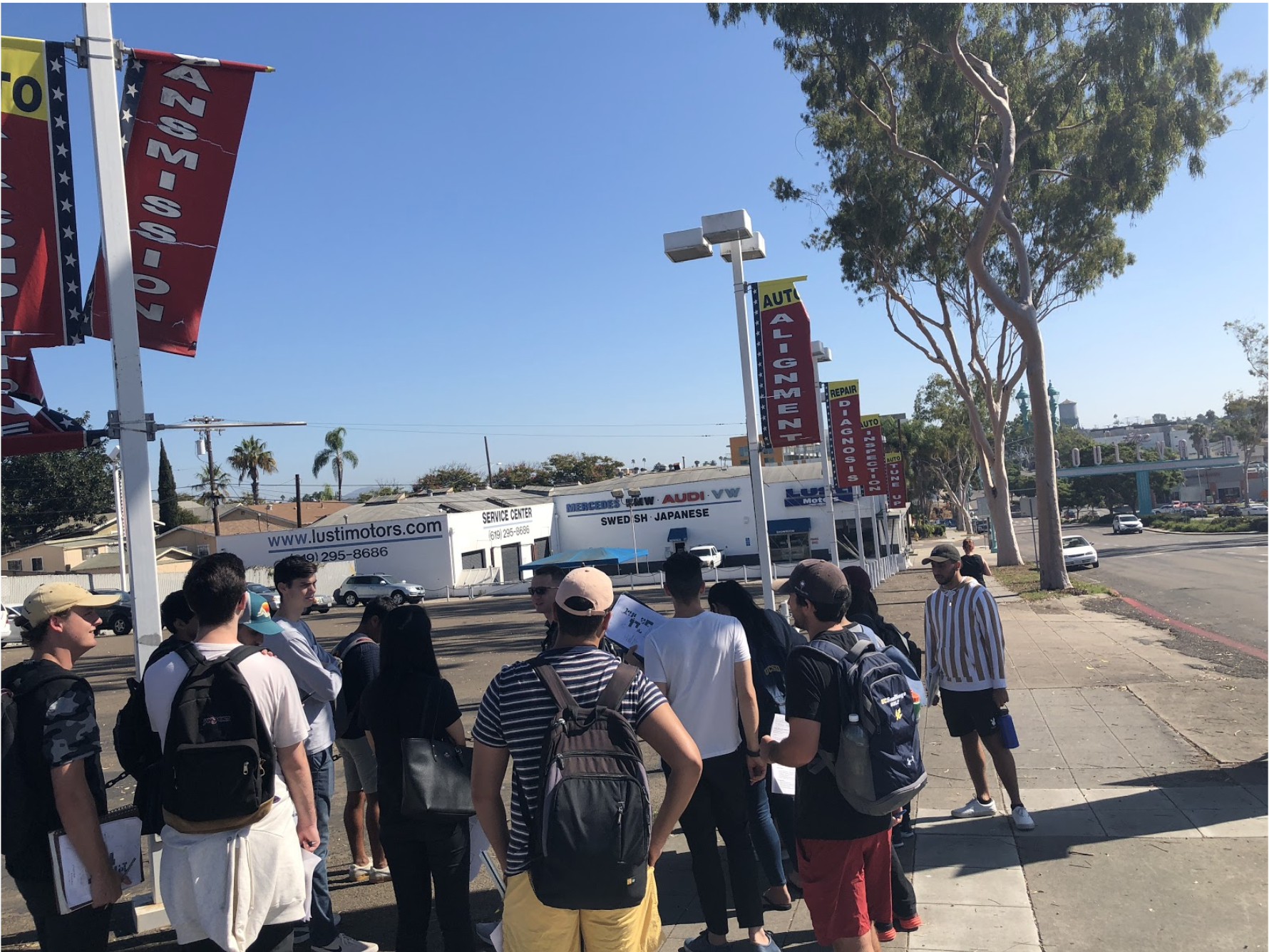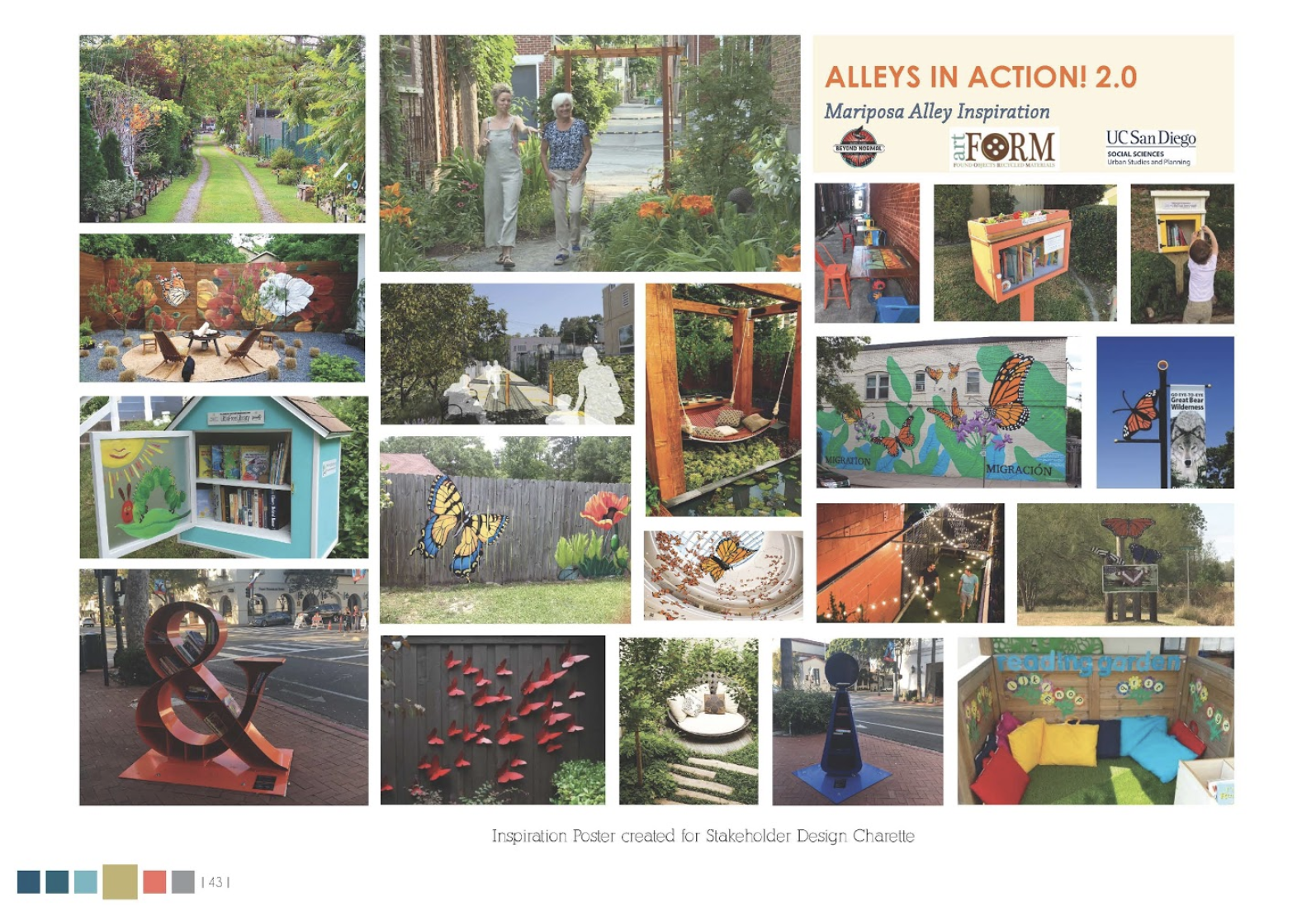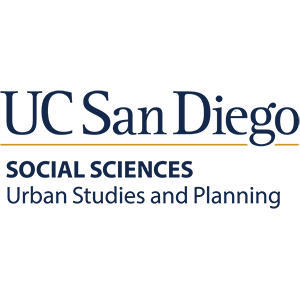ALUMNI 2020 SUMMER NEWSLETTER
It has been a big year for our small department. Just one year ago, Chancellor Pradeep Khosla approved the creation of a Department of Urban Studies and Planning at UC San Diego. The elevation of our program to the status of a department has allowed us to recruit our first full-time, tenure-track professors. We already had a higher concentration of award-winning teachers per capita than any other unit on campus, and our faculty continued their extraordinary winning streak this year when Sue Peerson was recognized with a Distinguished Teaching Award from the academic senate and Leslie Lewis was awarded this year’s Revelle College Outstanding Faculty of the Year Award and the Golden Apple Teaching Award from the Family Medicine and Public Health Department at the School of Medicine. Our students have continued to excel outside the classroom. The Young Planners Society won an award from the San Diego American Planning Association and took third place in the national American Planning Association competition for outstanding planning student association. A joint team of our Urban Studies and Planning majors and Real Estate and Development majors took first place in the NAIOP University Challenge Competition. We celebrated our 30th annual Urban Expo, which was the first ever Expo to showcase the work of our Real Estate and Development majors—and which also became, under the force of circumstance, our first-ever fully online event. Our team of instructors and our incredible administrative staff did the impossible and took our whole operation online literally overnight.
This year has changed everything. The Covid-19 pandemic is forcing everyone to think again about the meaning of home and work; about cities and suburbs; and about transit, housing, health, inequality, and the public good. Our cities and our regions will never be the same. But I feel confident that they will emerge stronger and better, because I know the students and alumni of our department who are planning and building a better future.
Thank you for staying connected to each other and to us in this time of social distancing. We all look forward to meeting again face-to-face.
Isaac Martin, Chair
Alumni News
- Erik Mumm ‘20 Elected to CPF Board
- Elizabeth Owen ‘20 selected as student rep for APA CA State Board
- Michelle Castro-Pilar ‘20 was awarded a fellowship with the APA Urban Design and Preservation Division
- Paul Gherini ‘13 selected as the USP Department’s 2020 Alumni of the Year
To submit an update to be included in our next Alumni Newsletter email atpau@ucsd.edu.
Faculty and Staff News
Changemaker Faculty Fellows
The Changemaker Faculty Fellows is a new initiative on campus hosted by the Teaching + Learning Commons. Faculty fellows for the inaugural cohort in the 2019-2020 academic year were selected through a competitive process. Three USP faculty members, Keith Pezzoli, Leslie Lewis and Mirle Rabinowitz Bussell, were selected to join the program. The aim of the program is to support faculty members in their continued efforts to integrate community engaged learning (CEL) into their teaching, research and public service and serve as campus leaders in CEL pedagogy and community engagement.
Student Awards and Accomplishments
- 2020 Urban Expo Award Winners
- USP Department Student Team Wins the 2020 NAIOP University Challenge
- Designathon projects win awards!
- Young Planners Society recognized by APA and SDAPA
RED Capstone Course
Creating an innovative mixed-use development for North Park
The first full cohort of Real Estate and Development (RED) majors completed a two-quarter RED Capstone during fall 2019 and winter 2020, analyzing planning codes and regulations, site constraints, financial considerations, and the market realities to determine the highest and best use for a site in North Park. Taught by faculty members Alex Norr and Sue Peerson, 17 students analyzed the feasibility of a redevelopment project at the site bounded by El Cajon Boulevard to the south, Park Boulevard to the west, Meade Avenue to the north, and an existing alley to the east. North Park is planned for more infill development along this multi-modal transportation corridor, making this the ideal site for a real-world capstone. Students conducted site visits to analyze the existing conditions and completed a series of mapping exercises to show how the proposed development will contribute to North Park’s goals and serve community needs.
Each team proposed a mixed-use development program with a focus on housing including affordable units, commercial space, and ground level uses to create a vibrant pedestrian environment. SketchUp 3D modeling was used to assess the site’s development capacity with building massing based on the allowable floor area ratio (FAR). Illustrative renderings, images and photos were also used to represent each team’s unique branding for the proposed project. The capstone culminated with team’s preparing an Investor Brochure to “sell” the concept, market, and financial expectations to theoretical investors/equity providers. Highlighted in the Investor Brochure were the key findings, market and economic analysis, financial pro forma metrics showing construction costs and timeline, as well as a 10-year cash flow to validate a successful redevelopment project. In addition to the collaborative team-based Investor Brochure, each student prepared a poster for display at the USP Urban Expo in March 2020.
 |
 |
|
| Students tour H.G.Fenton Company The BLVD project located on El Cajon Blvd. | Students visit the site of RED Capstone located in North Park at El Cajon Blvd. and Park Blvd. | Winning RED Capstone Poster by Sabrina Snowball |
Life Course Scholars Program
Life Course Scholars Program going strong, entering its sixth year
The Life Course Scholars Program is an interdisciplinary, cross-generational, multi-site learning experience for UCSD undergraduates aimed at transforming their understanding of aging, health, learning & research, and connecting them more deeply to the “people and places” of surrounding San Diego communities. This two-quarter practicum course series, taught by Dr. Mirle Rabinowitz-Bussell and Dr. Leslie Lewis, examines the implications of population aging, and enables students to explore first-hand the diversity of the aging experience. Originally funded by a Healthy Aging Initiative grant through the Stein Institute for Healthy Aging, and later supported by Bioregional Center funding, and a Changemaker Faculty Fellowship, the Life Course Scholars (LCS) program has had a transformative impact on both students in the course and elders in the community. Each cohort engages in a range of experiential and reflective activities, including oral history interviews, field research on the “age-friendliness” of local neighborhoods, a senior affordable housing tour, and a healthy aging project (HAP) capstone. Interactions, events and learning exchanges with local elders round out the program. Through these experiences, students broaden their perspectives about people’s lives in their later years, and develop a critical awareness of policies and structures that create disproportionately negative impacts on particular individuals and communities across the lifespan.USP Launches the Homelessness HUB (H-Hub)
Integrating Research and Pedagogy on Homelessness
The USP Department successfully launched an innovative new research project and experiential learning course focused on homelessness in San Diego. Led by faculty members Leslie Lewis and Mirle Rabinowitz Bussell and with generous philanthropic support from our RED Advisory Board member Mark Gleiberman and his wife Hanna, the project began last July. The research component focuses on an evaluation of the Safe Parking Program (SPP) run by Jewish Family Service of San Diego. The SPP provides safe overnight parking for unsheltered people who live out of their vehicles. SPP clients also receive access to case workers and housing navigators with the ultimate goal of helping every client exit into stable, affordable and permanent housing. The learning component has been incorporated into a very successful two quarter practicum sequence, Urban Challenges: Homelessness in San Diego. Taught for the first time this past year, the practicum provided 22 students with broad exposure to the complexity of the homelessness problem from historical, policy, structural, psychosocial and cultural perspectives. These students were also trained to support the research aims of the project and conducted over 75 oral history interviews with SPP clients in order to learn more about the individual stories and trajectories of unhoused people and amplify their voices. The project received a second year of support from the Gleibermans and will continue in the 2020-2021 academic year.
The Bioregional Center for Sustainability Science, Planning and Design
The Bioregional Center for Sustainability Science, Planning and Design
Defining research topics with communities requires long term commitments to establishing strong relationships, characterized by trust, respectful listening, and mutual regard. The Bioregional Center is engaged in a wide range of activities with community partners. Here are some examples. Environmental Activities: Creating and sustaining community gardens, food forests, green-blue infrastructure in the form of bioswales for stormwater management, water harvesting,aquaponics, and renewable energy microgrids turning food waste into soil and biogas. Planning and Design Activities: Supporting active living and a transition to inclusive, resilient, biophilic communities (i.e., safe streets, walkability, accessible open space,transformation of vacant lots and alleyways). Climate Action Activities: Mentoring Climate Action Scholars - a new practicum series currently in development for undergrads to learn about climate justice and action through hands-on collaboration in the community. Research Communication Activities: Creating Artful Resources for Visioning and Engagement (i.e., the CARVE Initiative) integrating changemaking powers of story and art (change the story, change the future). To learn more about these and other Bioregional Center projects and initiatives see: https://bioregionalcenter.
Exploring University-Community Partnerships
Last November, faculty in the Bioregional Center for Sustainability Science, Planning and Design held a symposium which brought together university and community partners from across the UC system doing place-based, civically engaged research and education on food systems. Funded by the UC Office of the President (UCOP), the symposium was the culmination of an 18 month UC Global Food Initiative (GFI) - funded project: Getting Neighborhoods EQUIPPED (Engaged thru Quality University-Community Infrastructure for Participatory-Research and Popular EDucation), which involved bringing over 400 students out to work and learn at the Ocean View Growing Grounds neighborhood garden and learning center in Southeast San Diego. The convening brought together diverse minds to discuss lessons, roadblocks and blind spots in trying to engage in authentic community engagement, pedagogy, and action. The guiding questions for the symposium included:
1) How do we engage in genuine ways (i.e., with curiosity, humility, respect, and shared learning) with local communities?
2) How do we draw students into this mix in ways that nourish, educate, and inspire them to be agents of positive change?
3) How do we overcome the very real challenges of trust-building, and consciousness-building (among our students, community members, and ourselves), especially in the face of unequal resources and power relations, and the on-the-ground impacts across our local neighborhoods of intersecting systems of inequity and oppression?
Alleys in Action! 2.0
Alleyways are an untapped resource of the public realm and urban fabric. Faculty member Sue Peerson worked with urban design students in fall 2019 and winter 2020 to study ways to transform alleys into vibrant public spaces. Investigating Normal Heights and North Park Allyson Osborn and Stephanie Belbeck conducted research on the community plans and city placemaking regulations. For her USP Honors Thesis Allyson Osborn expanded work from Peerson’s studio courses and prepared a comprehensive document showing how alleys can foster social gathering, sustainable practices, green corridors and much more. Osborn’s thesis is a guide with toolkit, engagement packet, mapping, and permit information for planners, designers, city departments, community residents and business owners to help them activate alleys. This research and community engagement work is the continuation of Alleys in Action! 1.0 winner of the San Diego Chapter (2019) and California Chapter (2019) American Planning Association Academic Awards.

